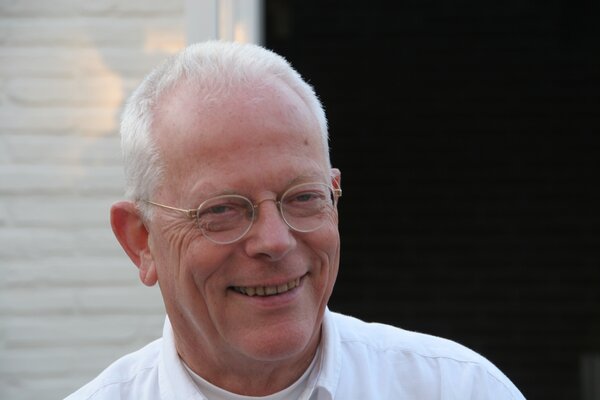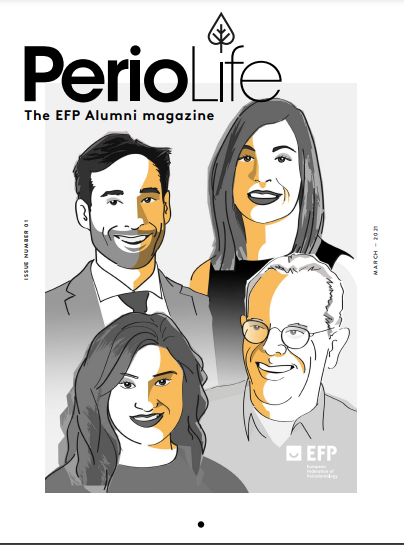Article, Education & Career
Ubele van der Velden describes how the EFP created accredited postgraduate programmes in periodontology
29 March 2021
Ubele van der Velden was one of the founders of the EFP and deeply involved in the creation of a network of universities to teach a postgraduate programme in periodontology accredited by the federation. In an interview with Myroslav Solonko, Professor van der Velden – programme director at the Academic Centre of Dentistry Amsterdam (ACTA) – explains the origins of the accredited programme that is now taught at 24 universities in 16 countries.

Perio Life: How did the idea of creating a unified system of accreditation of postgraduate programmes arise?
Ubele van der Velden: In 1987, the initiative was taken by the Dutch Society of Periodontology to co-ordinate periodontology in Europe. In 1988, I set up a European Co-ordination Committee in Periodontology as a first step towards the development of a European platform for deliberation and co-ordination in the field of periodontology. This committee – comprised of representatives of the Belgium, British, Dutch, French, German, Italian, Portuguese, Spanish, Scandinavian, and Swiss societies of periodontology – discussed the issue of undergraduate periodontal programmes, continuing-education courses, and postgraduate periodontal training. These ideas were formalised in the objectives of the EFP, which was founded in 1991. These objectives included promoting periodontal health in Europe through postgraduate education by defining a formal graduate speciality programme in terms of theoretical content, research, and clinical practice, and a standardised European accreditation system of periodontal specialist education.
PL:When you were developing the criteria for programme accreditation by EFP, did you use any already existing programme as a model? If so, why was that programme selected?
UvdV: In the Netherlands during the 1980s, the idea developed that there was a clear need for periodontal care at a specialist level outside the university departments. This idea was taken up by the Dutch Society of Periodontology (NVvP) and finally resulted in the establishment of the category of dentist-periodontologist with all the regulations that go with it. On this basis, the first periodontologists could be appointed in 1989 by the Consilium Parodontologicum of the NVvP. It was clear from the appointment of periodontologists based on their individual knowledge and skills that there was also a need for a formal training in periodontology. The established criteria for recognition as a periodontologist were used as a framework for the curriculum of a three-year MSc programme in periodontology, which started in Amsterdam and Nijmegen in 1991 under the respective leadership of Frank Abbas and Gordon Wolffe as programme co-ordinators. This curriculum was used as a framework for the development of the EFP’s postgraduate programme in periodontology.
PL:Which were the first programmes to receive EFP accreditation? Did these programmes fulfil all the necessary requirements from the beginning, or did they have to make significant changes to comply with the criteria that were established?
UvdV: The first two programmes were accredited in 1998 and were those of ACTA (the Netherlands) and Bern (Switzerland). At ACTA, the existing programme was immediately accredited. At Bern, a programme had existed for many years that had no formal examinations and in which some education was missing. However, in 1998 a formal master’s programme was introduced which included these omissions. This programme was unconditionally accredited. In 2000, the postgraduate programmes of the Sahlgrenska Academy in Gothenburg (Sweden) and the UCL Eastman Dental Institute (United Kingdom) were accredited.
PL: When the accreditation process was started, postgraduate programmes were perhaps rather different in terms of curriculum, facilities, teachers, etc. How did the programmes manage to overcome those differences and all adopt the single standard?
UvdV: At an EFP meeting in 1995, I was asked to prepare a comprehensive questionnaire appropriate for EFP use in evaluating of postgraduate programmes in periodontology. This resulted in the preparation of two documents, which became available in 1996: Quality Standards for Graduate Programmes in Periodontology and Graduate Programmes in Periodontology: Survey Questionnaire for Accreditation. By sending these documents to departments asking for information, it was made clear to them whether an application could be successful. On the basis of a completed questionnaire, it was decided whether the department merited a site visit for final accreditation or if additional information needed to be provided. The decision on whether a programme should receive accreditation was made after the site visit. Some programmes were accredited conditionally, and they then needed to fulfil all requirements within two years.
PL:According to the current definition, speciality training in periodontology includes a substantial implant component. When and why was this included in the definition?
UvdV: This change was made in 2011 and the Quality Standards document was renamed as Quality Standards for Graduate Programmes in Periodontology, Periodontics, and Implant Dentistry. The change was made because implant dentistry had become more and more important in periodontal practice and a number of European societies of periodontology had changed their names to include implant dentistry.
PL: Do you think that the definition of “periodontist” may change in the future?
UvdV: I never use the term ‘periodontist’ and, instead, use periodontologist (including the science). I don’t think that the name will change but rather that periodontologists will also call themselves “implantologists”.
PL: In terms of clinical practice, what is the advantage of completing the EFP-accredited programme, in comparison with non-accredited programmes?
UvdV: The advantage is that you can show patients a kind of guarantee that you are well-trained.
PL: Do you think that implant dentistry may become a separate speciality?
UvdV: I don’t think so, because implants are an aid in the various dental disciplines.
PL:What do you think about the perspective of the EFP Alumni project?
UvdV: I think that a platform of EFP alumni who are working in periodontal practice to exchange ideas, share information, ask for advice, and create study clubs is positive. However, it is not an easy project. An Alumni meeting every three years during EuroPerio congresses is, in my opinion, extremely important.
This article was originally published in Perio Life: The EFP Alumni magazine, issue 1, in March 2021
The full issue can be accessed here.





